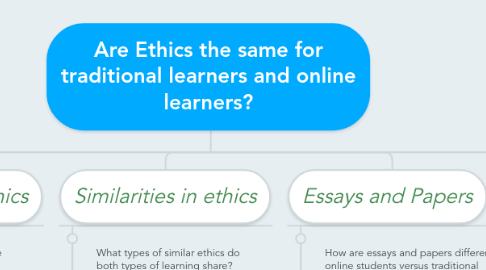Are Ethics the same for traditional learners and online learners?
by Josh Puckett

1. Differences in ethics
1.1. What is different about online learning ethics?
1.2. Is there a substantial difference in the overall ethics of either?
1.3. What do the numbers show?
2. Similarities in ethics
2.1. What types of similar ethics do both types of learning share?
2.2. Is there any data to support that there are shared sets of ethics?
3. Student's Perception of Ethics
3.1. How ethical do the students think they are?
3.2. How does this reflect on actual data?
4. Tests and Quizzes
4.1. Differences in taking tests and quizzes for different types of students
4.2. Perception of cheating on tests and quizzes versus the two learning platforms
4.3. What does the data show?
5. Essays and Papers
5.1. How are essays and papers different for online students versus traditional students?
5.2. What is the perception that people are cheating on the essays in papers for these two learning platforms?
5.3. What does the data show?
6. Resources
6.1. "College students' perceptions of ethics", Lau, Linda K; Caracciolo, Brandon; Roddenberry, Stephanie; Scroggins, Abbie. Journal of Academic and Business Ethics5 (Mar 2012): 1-13.
6.2. "A descriptive study of the ethical practices of students in both traditional and online environments at a university in Missouri", Ackerman, Chad D; White, Jason T. Journal of Legal, Ethical and Regulatory Issues11.1 (2008): 109-115.
6.3. "A comparison of student performance between two instructional delivery methods for a healthcare ethics course" STODDARD, HUGH A; SCHONFELD, TOBY. Cambridge Quarterly of Healthcare Ethics20.3 (Jul 2011): 493-501.
6.4. "Effects of Traditional, Blended and E-Learning on Students' Achievement in Higher Education" Awadh A. Y. Al-Qahtani, S E. Higgins. Journal of Computer Assisted Learning Volume 29, Number 3


